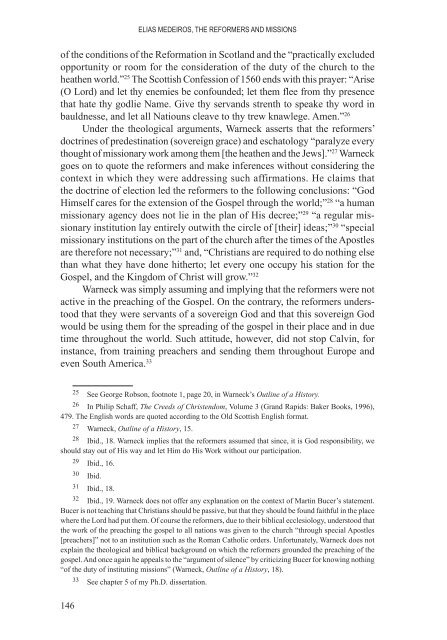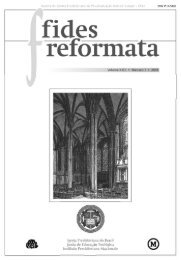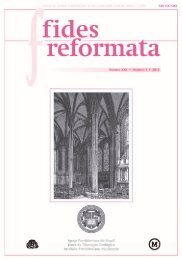Fides 22 N2
Um publicação do Centro Presbiteriano de Pós-graduação Andrew Jumper.
Um publicação do Centro Presbiteriano de Pós-graduação Andrew Jumper.
Create successful ePaper yourself
Turn your PDF publications into a flip-book with our unique Google optimized e-Paper software.
ELIAS MEDEIROS, THE REFORMERS AND MISSIONS<br />
of the conditions of the Reformation in Scotland and the “practically excluded<br />
opportunity or room for the consideration of the duty of the church to the<br />
heathen world.” 25 The Scottish Confession of 1560 ends with this prayer: “Arise<br />
(O Lord) and let thy enemies be confounded; let them flee from thy presence<br />
that hate thy godlie Name. Give thy servands strenth to speake thy word in<br />
bauldnesse, and let all Natiouns cleave to thy trew knawlege. Amen.” 26<br />
Under the theological arguments, Warneck asserts that the reformers’<br />
doctrines of predestination (sovereign grace) and eschatology “paralyze every<br />
thought of missionary work among them [the heathen and the Jews].” 27 Warneck<br />
goes on to quote the reformers and make inferences without considering the<br />
context in which they were addressing such affirmations. He claims that<br />
the doctrine of election led the reformers to the following conclusions: “God<br />
Himself cares for the extension of the Gospel through the world;” 28 “a human<br />
missionary agency does not lie in the plan of His decree;” 29 “a regular missionary<br />
institution lay entirely outwith the circle of [their] ideas;” 30 “special<br />
missionary institutions on the part of the church after the times of the Apostles<br />
are therefore not necessary;” 31 and, “Christians are required to do nothing else<br />
than what they have done hitherto; let every one occupy his station for the<br />
Gospel, and the Kingdom of Christ will grow.” 32<br />
Warneck was simply assuming and implying that the reformers were not<br />
active in the preaching of the Gospel. On the contrary, the reformers understood<br />
that they were servants of a sovereign God and that this sovereign God<br />
would be using them for the spreading of the gospel in their place and in due<br />
time throughout the world. Such attitude, however, did not stop Calvin, for<br />
instance, from training preachers and sending them throughout Europe and<br />
even South America. 33<br />
25 See George Robson, footnote 1, page 20, in Warneck’s Outline of a History.<br />
26 In Philip Schaff, The Creeds of Christendom, Volume 3 (Grand Rapids: Baker Books, 1996),<br />
479. The English words are quoted according to the Old Scottish English format.<br />
27 Warneck, Outline of a History, 15.<br />
28 Ibid., 18. Warneck implies that the reformers assumed that since, it is God responsibility, we<br />
should stay out of His way and let Him do His Work without our participation.<br />
29 Ibid., 16.<br />
30 Ibid.<br />
31 Ibid., 18.<br />
32 Ibid., 19. Warneck does not offer any explanation on the context of Martin Bucer’s statement.<br />
Bucer is not teaching that Christians should be passive, but that they should be found faithful in the place<br />
where the Lord had put them. Of course the reformers, due to their biblical ecclesiology, understood that<br />
the work of the preaching the gospel to all nations was given to the church “through special Apostles<br />
[preachers]” not to an institution such as the Roman Catholic orders. Unfortunately, Warneck does not<br />
explain the theological and biblical background on which the reformers grounded the preaching of the<br />
gospel. And once again he appeals to the “argument of silence” by criticizing Bucer for knowing nothing<br />
“of the duty of instituting missions” (Warneck, Outline of a History, 18).<br />
33 See chapter 5 of my Ph.D. dissertation.<br />
146




